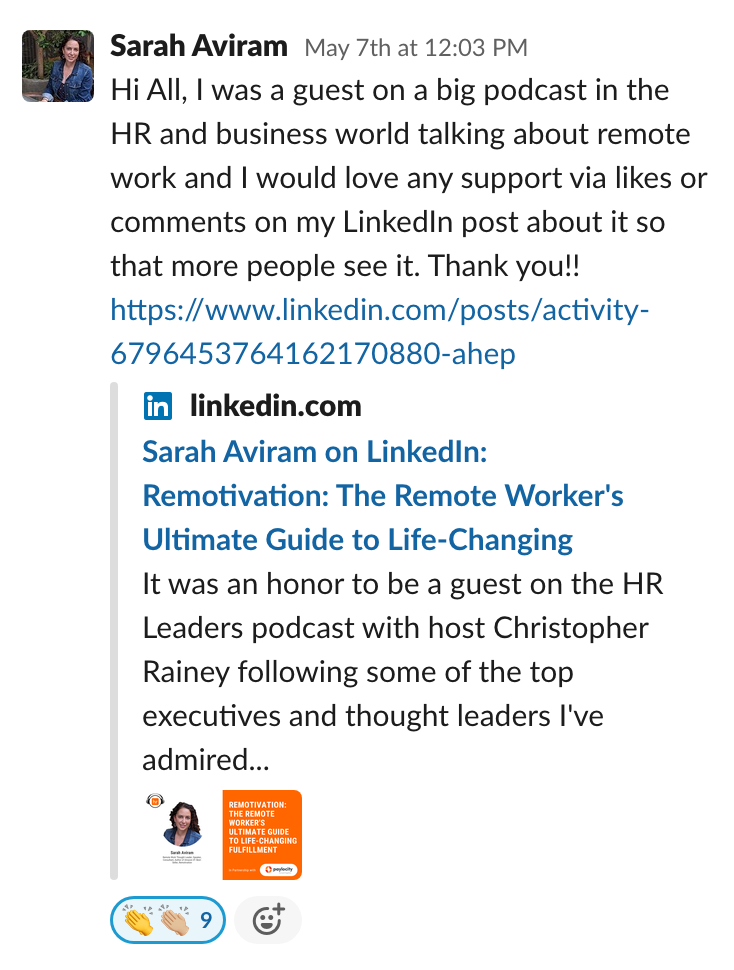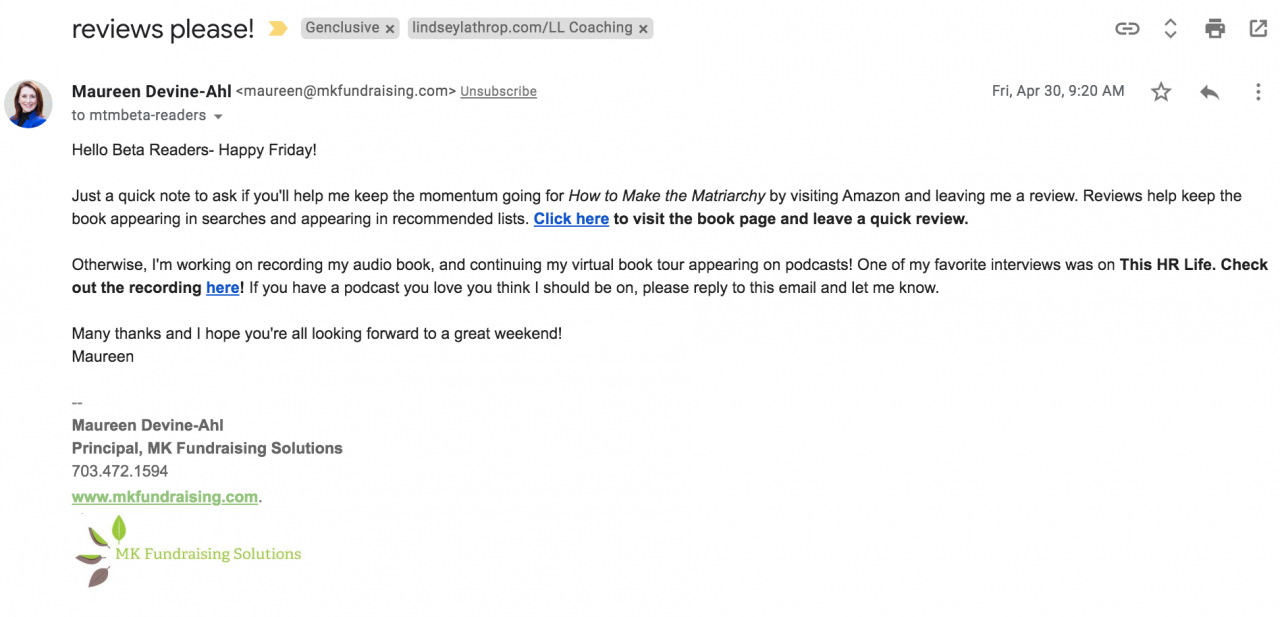How to Ask For and Use Reviews & Testimonials as an Employee and Entrepreneur
Pop quiz!
Are you more likely to…
… try a restaurant that a friend has raved about – or – one that you’ve heard zero about?
… buy a new coffee maker that was featured in Consumer Reports – or – has no product reviews?
… post a job to a FB group you’re a member of – or – submit it to a directory you have no relationship with?
My guess is the restaurant your friend recommended, the coffee maker you’ve read reviews for, and the FB group you actively participate in.
Unless you’re being extremely intentional about being unbiased. In that case, bonus points for you (minus the yucky coffee you could end up with).
Reviews and endorsements are shortcuts. They create (and forward along) our reputations (hello word of mouth marketing), they set up expectations, and they can fast-track us to have more success.
Unless it’s a negative review. Don’t worry – I’ll talk about how to recover later on.
As Communication Strategist, Sarah Audet – @nonprofitsarah – shared in her recent post below that inspired me to write this article:
“Client and customer reviews are good for your business. They boost your credibility. They increase sales and contracts. They inform your marketing. And they can even improve your products and services. Wins all around.”
Yet most of us would rather do anything else than ask for a review (including hug a jellyfish – funny, Sarah!) because as she says “It feels a little needy, like you’re passing a note in class: “Do you like me? Check yes or no.”
Translation: We’re opening ourselves up to critique (and possible rejection)…
…while discounting the fact that we’ve survived harder things than hearing a POSSIBLE (yes POSSIBLE) piece of feedback that could be extremely helpful to our career, businesses, [insert thing you do and offer.]
So – now that we’ve established reviews don’t have to be all that scary and are an extremely helpful credibility building tool – who should we ask for them and how do we do it?
Who can ask for reviews:
Everyone at all levels can ask for reviews. Employees, entrepreneurs, funders/investors, writers, speakers, podcasters, romantic partners, parents and kids.
👨👩👧 A good friend of mine asked his daughter how he was doing at being her dad. She told him she didn’t like his “loud voice” and they’ve improved their communication…well, as much as you can with someone who is 3 years old.
❤️ On our anniversary, Colin and I review our wedding vows to see what we can improve in our marriage. It might not sound super romantic, but it is to us. We want to stay together for the long haul.
💬 A client’s boss told her she wasn’t connecting enough with colleagues when the truth was the exact opposite. Turns out she thought her boss would notice. Yeah, no. That led her to keep her boss updated regularly on who she was connecting with and it led to an eventual promotion.
⭐ In my coaching business, reviews have helped me streamline processes with clients and learn what kind of offers people want most. The good ones have kept me going when I’ve wanted to throw in the towel.
How to ask for reviews (with sample language):
To ask for a review that will actually be useful to you, you need to know the answers to these questions:
Who is important to your success? Where do they hang out? What’s the best way to get them to respond?
What do you specifically want feedback on? What is going to be important to your growth?
What will you use the review for? Is it for your own personal use or for the public?
Once you have that information, you can put together your review process.
How to ask for reviews as an employee:
If you’re an employee, your organization may be formal review processes already in place. They could include:
A traditional review with your manager: 90 day, 6 month, annual, etc.
“Fast feedback” from colleagues using a performance management app like 15five, Culture Amp, Workday, or a recognition channel on Slack
“Post-mortem” or “after action review” team conversations once a project has ended (I love Diana Kander’s After Action Review process)
If any of these avenues to feedback exist, are you making use of them? If you’re not, what would it look like to set a “review date” with yourself once a month where you ask a few people for feedback? The apps make it super easy because you can choose from a list of questions and send the requests out automatically.
If these review processes don’t exist, how can you help set them up? Chances are you’re not the only one craving evaluation. Have a conversation with your boss about wanting more frequent feedback. If they’re not receptive (ahem, not a good leader), then take it up the chain. Ask HR what exists and how you can work together on creating a process together.
Example email language to use when requesting a review from a colleague:
If you’ve been working on a specific skill…
Hey!
As you know, I’ve been trying to work on [skill you’ve been working on – like speaking up at meetings or giving more air time at meetings]. Can you let me know how I’m doing? And one idea for improvement?
Appreciate you,
Lindsey
If it’s more general…
Hey!
One of my goals this year is to get more comfortable with receiving feedback. Your opinion is valuable to me and I have a few questions I’d like you to weigh in on if you’re open to it.
[Insert link to the survey where you’ve curated the questions] OR add them in the body of the email like:
Any improvements I can make with my [skill]?
How would you rate my ability to [skill]?
What’s one way I can strengthen my [skill] with the team?
Appreciate you,
Lindsey
How to ask for reviews as an entrepreneur:
If you’re an entrepreneur, it will be up to you to set up a customer/client review process. Here are a few ideas for you:
1) Keep it simple (and free). It could be as straightforward as a one question email. “What difference has this experience made to you?” or “What’s one thing you’re walking away with from this experience?” Make it even easier on yourself by creating a snippet.
2) Use Survey Monkey, Jot Form, or a Google Form to collect more feedback. It will be on you to send an email out requesting they complete the form.
3) Set up a “Google My Business” page so you can collect reviews on Google. Again, you will need to direct clients there.
4) Request LinkedIn recommendations.
5) Use a paid service like Hubspot Customer Feedback, Typeform, EmbedReviews or one of the many other tools that exist. Only use these if it’s worth the ROI.
Example email language to use when requesting a review from a customer or client:
Hi [client name]!
Knowing many of us head to website reviews, Google and LinkedIn before we hire people to help us, I’m asking for YOUR help. Would you be willing to leave me a review on one or all three of the links below?
Ways you can help:
Write me a website testimonial using this form (your confidentiality is my #1 priority – please tell me what identifiers you’re comfortable with)
Leave me a LinkedIn recommendation (you must be logged in. Once my profile pops up, click on the “More…” box next to the “Message” box. You’ll see “Recommend” as an option)
Leave me a Google review (you’ll need a Google account)
With appreciation,
Lindsey
How to get feedback and testimonials back when you request them:
Make it easy. Pick a couple of questions that are most important to you. Here are a few you could ask:
What difference did I make in our working relationship? What makes it stand out?
How did I support you? What was life/work/the project like before we worked together and what’s it like now? What have you been able to go on and do?
When you get an email from me - what are three words that come to mind? (This one tends to get a laugh b/c it sounds like an opener to a joke - and - it has a lot of potential to get at the qualities you bring to working relationships!)
Can you describe a situation where I went above and beyond your expectations? What surprised you?
Tell the reviewer specifically what you’d like them to comment on. Is it how quickly your turnaround time was? The fact that you went above and beyond for them? That you were an incredible sounding board? That you make the best cookies?
Tell them how you will be using their feedback and ask what identifying information they are comfortable with you using.
Give them the language. If you know they’re super busy, write it for them and welcome them to edit as they see fit. When I’ve done this, most people change a thing or two to add their mark and then it’s good to go.
Other sources of valuable feedback anyone can ask for:
To leave you a LinkedIn recommendation on your profile. Yes, this includes the team you work with currently. You don’t have to wait until you leave. You can also ask folks OUTSIDE your company for a recommendation.
To leave a comment on a podcast you host or an episode you were interviewed on.
To leave a comment on an article you published.
To review a book you wrote.
To comment on a social media post you want more algorithm traction on.
To comment on a presentation / speech you gave through a survey (either paper copy or electronic).
Two other places to get feedback that you may not be thinking of:
Pay attention to how someone introduces you – what’s the language they use?
Have a website? What do your Google Analytics and Google Search Console say about where people click most and the keywords they use to find you?
Top 5 places to use reviews and testimonials as an employee:
When you’re meeting with your supervisor, bring your recent pieces of positive feedback.
In your LinkedIn About section. Since you have to scroll to get to recommendations on your profile page, take one of your best reviews and paste it in your About section.
On your professional website / portfolio. Create a “What people are saying…” or “Reviews” or “Testimonials” page. You can also embed an app (like this) that compiles reviews for you.
On your resume. No, you won’t directly quote someone, but you could use language like “Known for… [insert colleague’s compliment] in your resume profile section.
When you’re sharing wins as a team, read a piece of feel-good feedback out loud.
Top 5 places to use reviews and testimonials as an entrepreneur:
On your website (see above) or on a program landing page.
In your email signature. (Make a snazzy email signature using Hubspot’s signature generator.)
During a sales call with a potential client. You can pepper in some stories of client results.
Similarly, use reviews in a sales email. If possible, use screenshots of reviews from prior participants / clients. They look more real. Just don’t go overboard.
In your workshop description write-ups, professional bio and speaker introduction. Similar to my resume suggestion above, you could use language like “Recognized for being…”
🔥🔥HOT TIP:
If you get a long testimonial / quote back from the reviewer and you want to use a section of it to make it easier to digest, edit it into a quote you want to use. Send it back to the person and ask them if they feel comfortable with you using the new version.
This:
“While looking for a professional coach, I had 1-to-1s with a few different people to assess if we’d be a match/fit. My ‘discovery’ call with Lindsey didn’t feel like an introduction, she went straight into the work. She didn’t hedge bets or dangle carrots so that I would sign on with her, she just coached me from the first moment. I appreciated her immediate openness and trust; it brought out the same in me.”
– Candice, Marketing & Branding
Becomes:
“Lindsey didn’t hedge bets or dangle carrots so that I would sign on with her, she just coached me from the first moment. I appreciated her immediate openness and trust; it brought out the same in me.”
– Candice, Marketing & Branding
Examples of asking for reviews that I like:
BTW – Maureen Devine-Ahl went on to publish her amazing book – How to Make the Matriarchy. She has said the feedback she asked for and received along the way was paramount to it’s success. She made her reviewers feel like part of the process and as one of them, I can say that motivated me even more to get the word out. Buy and read her book!
How to recover if you get a bad review or difficult feedback:
You get to choose your own adventure. You can sulk. Get mad. Get quiet. Talk bullshit about the reviewer. Or you can do something productive with the feedback. If you’re able to, find out more. See if the person is open to talking about their critique. The more you know, the more you can grow. Ya know that saying “feedback is a gift”? It can be. There might be things you’re doing and saying that are giving you the exact opposite results you want to have in your career. How great to know what those are so you can work on them.
Then there’s that feedback that’s just not useful. It’s just really shitty. And it’s coming from a shitty person with nothing else to do with their time. Like internet trolls. They deserve ZERO of your headspace. Don’t allow them the satisfaction of getting to you.
And then there’s the negative feedback you get and you have no way of getting in touch with the person who gave it to you. Like the time Colin had someone write about his presentation “I found it very talky.” What was he supposed to do with that? It was a talk. And talks are talky. It took a little coaxing, but I reminded him of the 300 other positive reviews he got. And he let it go.
When we open ourselves up for review, it doesn’t mean others get the final say about our value. WE DO.
Hopefully this has encouraged you to get curious about your reputation. There are so many benefits to other people using THEIR words to describe what it is you do. Don’t be afraid of asking for reviews. You will get a “bad one.” It happens to the best of us. You’ll survive it, vent to a friend and move on. You have more important things to do.





